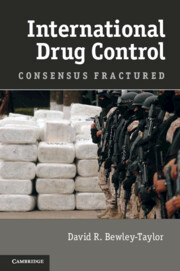Book contents
- Frontmatter
- Contents
- Figures and maps
- Tables and boxes
- Preface and acknowledgements
- Abbreviations
- 1 Introduction
- 2 Soft defection and the domestic normalization of harm reduction
- 3 Harm reduction at the UN: member state tension and systemic dissonance
- 4 Cannabis, soft defection and regime weakening
- 5 Defending the regime: the International Narcotics Control Board
- 6 Beyond regime weakening? Lessons from the UNGASS decade
- Index
- References
5 - Defending the regime: the International Narcotics Control Board
Published online by Cambridge University Press: 05 December 2012
- Frontmatter
- Contents
- Figures and maps
- Tables and boxes
- Preface and acknowledgements
- Abbreviations
- 1 Introduction
- 2 Soft defection and the domestic normalization of harm reduction
- 3 Harm reduction at the UN: member state tension and systemic dissonance
- 4 Cannabis, soft defection and regime weakening
- 5 Defending the regime: the International Narcotics Control Board
- 6 Beyond regime weakening? Lessons from the UNGASS decade
- Index
- References
Summary
[The fight against drugs] will be won. It has been won in a number of countries. It will be won.
Dr. Philip O. Emafo, INCB member and former president, 2008Under the Presidency of Sir Harry Greenfield, the operation of the Permanent Central Opium Board (PCOB) has been described as ‘the judicious pursuit of “quiet diplomacy”’. Such an approach is clearly in marked contrast to that adopted by the PCOB’s successor body during the UNGASS decade. The character of the INCB has undoubtedly fluctuated periodically since it began its operations under the Single Convention in 1968. It is perhaps no coincidence, however, that an increasingly vocal and what can be considered un-diplomatic approach towards exercising its role has taken place during a period when the original prohibitionist vision underpinning the current regime has come under increased and widespread pressure. As the evidence presented in the preceding chapters demonstrates, soft defection from the regime’s authoritative norm in relation to both some harm reduction interventions and various approaches to the use of cannabis at the national and sub-national level have elicited hostile responses from the Board; a body that is becoming increasingly isolated in its faith in a punitive approach to the illicit use of drugs. Beyond this dynamic, the Board’s defensive stance and maximalist interpretation of the conventions also raises questions about the overall nature of its operation within the UN drug control apparatus.
- Type
- Chapter
- Information
- International Drug ControlConsensus Fractured, pp. 219 - 278Publisher: Cambridge University PressPrint publication year: 2012
References
- 1
- Cited by

